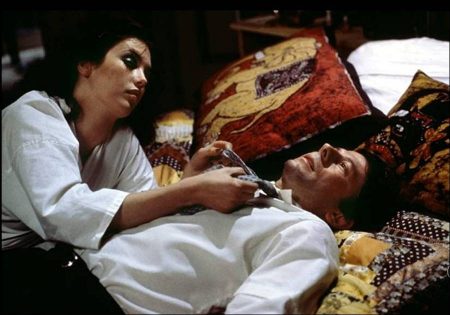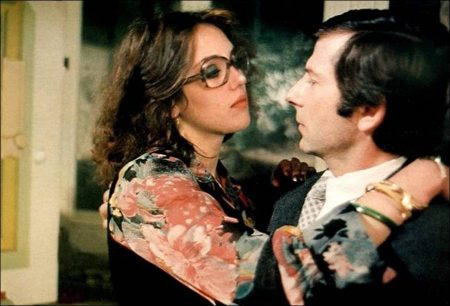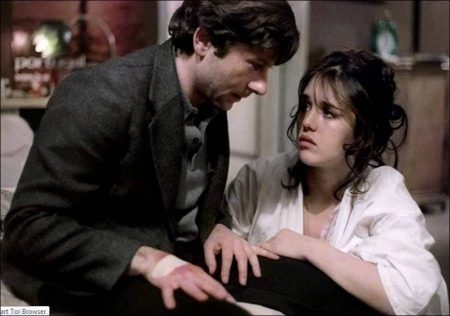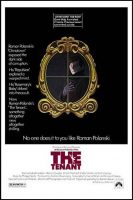In Paris, the shy bureaucrat Trelkovsky rents an old apartment without bathroom where the previous tenant, the Egyptologist Simone Choule, committed suicide. The unfriendly concierge (Shelley Winters) and the tough landlord Mr. Zy establish stringent rules of behavior and Trelkovsky feels ridden by his neighbors. Meanwhile he visits Simone in the hospital and befriends her girlfriend Stella. After the death of Simone, Trelkovsky feels obsessed for her and believes his landlord and neighbors are plotting a scheme to force him to also commit suicide.
The Tenant (French: Le locataire) is a 1976 French psychological horror film directed by Roman Polanski, starring Polanski, Isabelle Adjani, Melvyn Douglas, and Shelley Winters. It is based upon the 1964 novel Le locataire chimérique by Roland Topor and is the last film in Polanski’s “Apartment Trilogy”, following Repulsion and Rosemary’s Baby. It was entered into the 1976 Cannes Film Festival. The film had a total of 534,637 admissions in France.
Kafka influence
Many critics have noted The Tenant’s strong Kafkaesque theme, typified by an atmosphere that is absurdly over-burdened with anxiety, confusion, guilt, bleak humour, alienation, sexual frustration and paranoia. However, the film cannot be viewed as purely driven by a Kafkaesque motif because of the numerous references to Trelkovsky’s delirium and heavy drinking. This allows for more than one interpretation.
Most of the action occurs within a claustrophobic environment where dark, ominous things occur without reason or explanation to a seemingly shy protagonist, whose perceived failings as a tenant are ruthlessly pursued by what Trelkovsky himself views as an increasingly cabalistic conspiracy. Minor infringements are treated as serious breaches of his tenancy agreement, and this apparent persecution escalates after he refuses to join his neighbours in a prejudiced campaign to oust a mother with a disabled child.
“The scheming plots over matters of extraordinary pettiness and inexplicable conspiracies that go on among the neighbours to gang up on others make The Tenant probably the first Kafkaesque horror film.”
“Much effect is derived from the absurdity of the scenario where all Trelkovsky wants to do is not bother anyone, yet everything Trelkovsky does is seen as an imposition.”
Critics have speculated that the film’s Kafkaesque atmosphere must be in part a reflection of Polanski’s own Jewish experiences within a predominantly anti-Semitic environment. Trelkovsky is viewed with suspicion by almost every other character simply because he is a foreign national. For example, when he tries to report a robbery to the French police he is treated sceptically and told that as a foreigner he should not make trouble. Both the director and the protagonist are outsiders who strive ineffectually for acceptance in what they see as a corrupt and mysterious world.
Vincent Canby wrote in The New York Times: “Trelkovsky exists. He inhabits his own body, but it’s as if he had no lease on it, as if at any moment he could be dispossessed for having listened to the radio in his head after 10 P.M. People are always knocking on his walls.”
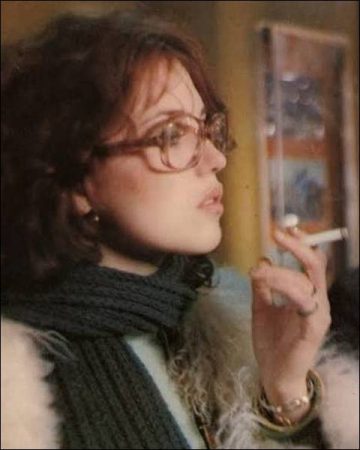
According to Ulrich Behrens of Der Mieter (translated from the German):
“The film’s title [of The Tenant] could be interpreted as follows: An alien is given the chance to rent an apartment for himself in a well-ordered world, however he may be evicted at any given time once the natives find him to be in violation of this world’s well-ordered rules, or failing to properly internalize them.
In the end, it is of little importance who is normal and who is insane. The individual’s paranoia equals our well-ordered world’s desire to persecute. Nobody can help Trelkovsky – he can’t even help himself. In a disenchanted, jaded world with its fixed social order, the individual and one’s autonomy have but one fate: Either submission and internalization of people’s rules – or insanity. Which is no real choice. Here, the individual is always on the brink of annihilation, about to lose itself.”
Sexual deviance and repression
Related to the aforementioned kafkaesque guilt and the theme of identity loss, another theme that appears throughout the film is that of sexual deviance and Trelkovsky’s increasing trespassing of traditional gender roles, as he more and more turns into an echo of former tenant Mme. Choule. German reviewer Andreas Staben writes:
“And again, [Polanski] tells of sexual repression, and in Polanski’s astounding, unpretentious performance, Trelkovsky’s escape into the identity of Simone Choule appears as a consequential closure of all three films [of the Apartment Trilogy]. Other than was maybe the case still with Repulsion, there can be no talk whatsoever of a psycho-pathological case study anymore: Here, the individual is entirely wiped out and all that remains is the horror of facing a pure void.”
“In The Tenant, Roman Polanski explores again the psychic terrain of guilt, dread, paranoia, fears of sexual inadequacy and hysteria he made so familiar in Repulsion, Rosemary’s Baby, Macbeth, and Chinatown. […] The confusion of sexual roles is more pronounced here than anywhere else in [Polanski’s] work.
The slightly decadent and fetishistic, but innocent, bedtime games of Cul-de-sac have developed into the signs of a basic confusion concerning sexual identity. T.’s acquisition of feminine costume and habits speaks to a repressed and disturbing need. He is not attracted to women, in fact cannot perform sexually when Stella (Isabelle Adjani) takes him home.
In this respect he is again the counterpart of Simone Schoul who, he is told, was never interested at all in men. As he is drawn more completely into the idea of becoming this woman, T. pauses to speculate about what defines him. If a man loses an arm, he wonders, does the arm or the remaining body define his selfhood? How much can a man lose, change, or give away and still remain ‘himself’? Or, to paraphrase the advertisers, does the cigarette make the man?”
— Norman Hale (Movietone News, no. 52, October 1976, p. 38-39), Review: Tenant[28]
The Tenant (1976)
Directed by: Roman Polanski
Starring: Roman Polanski, Isabelle Adjani, Melvyn Douglas, Jo Van Fleet, Rufus, Shelley Winters, Lila Kedrova, Claude Piéplu, Romain Bouteille, Jacques Monod, Patrice Alexsandre, Josiane Balasko
Screenplay by: Roman Polanski, Gérard Brach
Production Design by: Pierre Guffroy
Cinematography by: Sven Nykvist
Film Editing by: Françoise Bonnot
Costume Design by: Jacques Schmidt
Art Direction by: Claude Moesching, Albert Rajau
Music by: Philippe Sarde
MPAA Rating: None.
Distributed by: Paramount Pictures (through Cinema International Corporation
Release Date: May 26, 1976 (France), June 11, 1976 (USA), October 8, 1976 (Finland)
Views: 493
